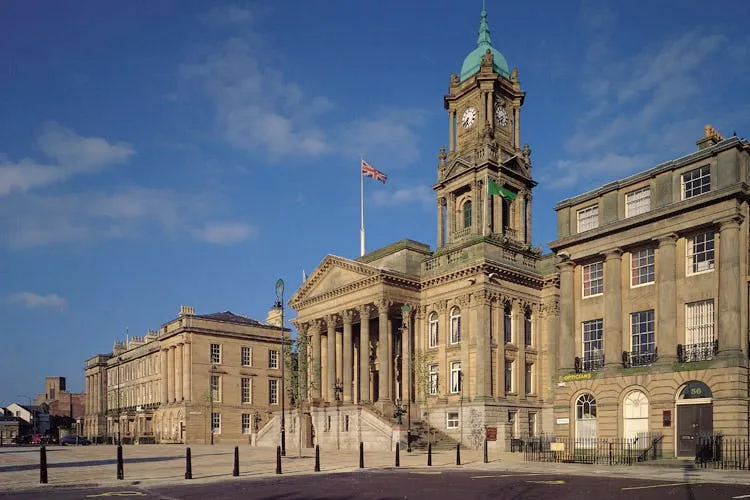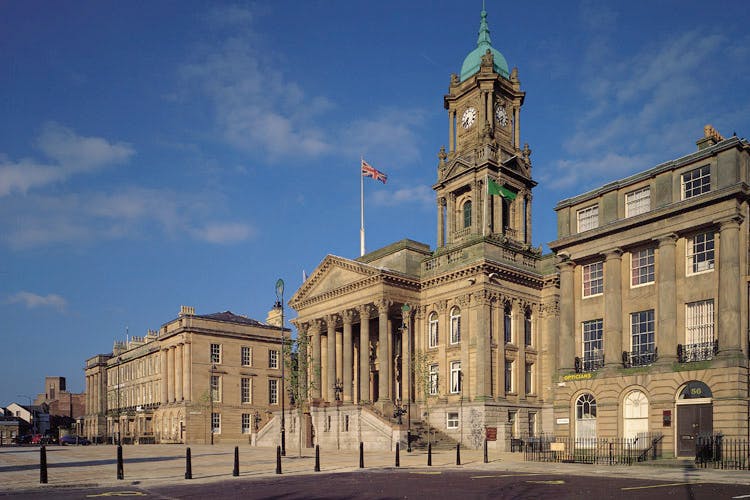Levelling up Birkenhead: shovel-ready or stuck in the sand?

We take a look at why levelling up is taking so long, plus the rest of your weekly briefing
Dear readers — welcome to this week’s Post briefing. In this edition, we ask why Birkenhead is struggling to get its hands on a pot of levelling up money that has been promised by the government. We also have a beautiful Home of the Week in the former Tobacco Warehouse (price on request), and an interesting piece about modern-day racism on the Liverpool docks.
Last week, we published an interesting (members-only) report from Mollie about the Beechwood estate on the Wirral. She writes:
Then, in 2004, one of those teenagers got back in touch. A Guardian long read detailed how their lives became devastated when heroin entered the estate, replacing weed. All were young kids when they began smoking heroin, and quickly became addicted. Only three managed to quit drugs. Four had died.
You will be glad to know we’ve just commissioned another feature from David Lloyd, who wrote our recent weekend read about the Adelphi Hotel, which quickly became one of our most popular ever stories. If you haven’t read that one, dive in now.
There are actually two queues — one for people to get their electronic room key and a second for people who’ve come back down to reception because it doesn't work. Soon, I will form the start of queue number three: people who’ve returned to reception because their keycard doesn’t work, had it run through the card reader, only to find that it still doesn't work and had to traipse back down to reception again.
David is writing about the decision from Marks & Spencer to leave the Church Street location they’ve had for almost a century for a new home in Liverpool ONE. What does it mean for the high street and other local shops? What does it tell us about how Liverpool is changing? If you want to chew his ear off about that, hit reply to this email and we’ll forward your message on.
🌥 This week’s weather

This week’s weather forecast is sourced from the Met Office and it’s for Liverpool.
The big story: Shovel-ready or stuck in the sand?
Top line: Birkenhead is still waiting for the £25m they were awarded by the government last July from the Town Deal fund. Many believe this is down to the government’s “backwards-forwards” way of handing out money intended to help level up local economies.
Wirral Council have only received about 5% of the promised money. “Funding for projects is subject to business case approval and further approval from [the government] before the allocations can be confirmed,” they said last year. We asked the council for an update on where their regeneration plans are up to today and are awaiting a response.
Context: A recent report by the Public Accounts Committee found that while the government has succeeded in allocating lots of money to local authorities around the country, they’ve done it without fully understanding how it will be spent, or how it would help.
- The report said that over-optimistic bids were awarded money over more realistic plans. These “shovel-ready” schemes — meaning ready to start work on right away — have since been beset with delays.
The Committee also found that the government were announcing big funds and then giving councils tight deadlines to apply. This meant they awarded money to half-baked ideas, and are now holding back the money until councils can develop them more fully. The report also found that councils were only told what kinds of bids the government wanted after they had already submitted their own.
“This is a profoundly crappy system for allocating resources,” says David Thame, an editor at property website Place North West, who wrote a very informative newsletter about this issue last week.

The difference with Birkenhead is that their regeneration plans appear to toe the line between ambitious and realistic. In fact, the council has been shortlisted for a national award for their forward-thinking framework, which includes:
- A new transport museum, as well as extensions of the area’s other cultural venues.
- A big focus on developing skills via small business hubs and creative workspaces.
The latter, investing in local people and skills, is what Thame says actually helps local economies, rather than high street flower beds, new benches and shiny buildings: “No economy will be successful until you've got people with skills that other people want to buy,” he told The Post.
Liam Kelly, CEO of Make CIC — who are set to expand their creative workspace with Town Deal money — said that meeting government requirements to draw on the funds awarded to Birkenhead was time-consuming and expensive for small companies:
All of the things that are expected from these kinds of funds, from DLUC (Department of Levelling Up and Communities), that bar is quite high. And, the kind of advice and support that organisations like ours require is expensive and time-consuming. And that has been a challenge.
Bigger picture: This may not be the first time you hear about faltering levelling up projects. The government continues to allocate headline amounts of money without a sophisticated understanding of how it will help local communities and rarely follows how that money is spent. We’ll return to the issue soon.
Your Post news briefing
- A third suspect has been arrested in connection with the death of Dom Phillips, a journalist from the Wirral who was killed in the Amazon alongside his guide Bruno Pereira. Jeferson da Silva Lima turned himself in to the Atalaia do Norte police station in the Amazon after originally going on the run. It’s now understood that five new suspects are alleged to have helped hide the bodies in a hard-to-reach area.
- There will be a parliamentary debate on whether a public inquiry should be held into the murder of James Bulger. James’s mother, Denise Fergus, has called for the inquiry, saying that "a number of issues have been swept under the carpet”, including claims that Jon Venables had been rehabilitated. It follows Denise’s petition to have the debate receiving 213,000 signatures, as well as her meeting with Justice Secretary Dominic Raab.
- It is now your very last chance to have your say on the future governance of Liverpool: the consultation on how the city council should be run ends midnight. It asks whether you think the council should continue to be run under the mayoralty, a leader and cabinet model, or move to a committee system like Sheffield has done.
- And in case you missed it: Merseyside’s only Michelin star restaurant, Fraiche, announced its plans to close at the end of the year. The restaurant, in Oxton on the Wirral, has been open for almost 20 years.
Home of the week

A very fancy two-bedroom apartment in the modernised former Tobacco Warehouse on the Docks just came on the market — with the price available on request. It has views of the Mersey, mezzanine floors and lots of exposed brickwork.
Post Picks
🎏 It’s summer solstice tomorrow, marking the longest day of the year. The arts and health initiative Squash Liverpool is hosting a free community dinner and celebration this evening, among gardeners, artists and healing practitioners.
📚 Olivia Harrison is in conversation with Peter Asher, legendary producer and close friend of the Beatles, at Waterstones in Liverpool ONE on Wednesday, discussing her new poetry collection reflecting on her life with George Harrison.
🎤 Syrian singer Omar Souleyman is performing at 24 Kitchen Street on Thursday. He performs in the style of dabke, line dancing for weddings, and is hugely popular in the Western dance scene.
🎭 There’s an outdoor performance of Shakespeare’s Twelfth Night at Speke Hall on Thursday evening by the acclaimed touring theatre company Three Inch Fools. Tickets are £18, and it’s recommended you bring your own blankets and cushions.
🌮 The Wirral Food and Drink festival is coming to the Bloom Building in Birkenhead this weekend. Tickets are £5, and include live DJs and dog-friendly spaces.
Our favourite reads
We liked this first-person piece in Huffington Post by Dr Pragya Agarwal, a professor of social inequalities and injustice at Loughborough who is based on Merseyside. She discusses how black and brown mothers are disproportionately judged for their parenting, compared to white mothers. “My children and I were in a small café by the Liverpool docks when I noticed an elderly couple kept staring at me — and at my kids. Though I began to feel uncomfortable, I tried to think nothing of it when suddenly the elderly lady spoke out, loudly and harshly. ‘Get your children to shut up. Now.’”
An interesting feature in Tribune Magazine about the socialist thinker Doreen Massey, who found alliances in feminist groups in Liverpool and optimism in the council’s militancy, based on a new collection of her essays from the 1980s. “It is rare to read a book of work mainly from the 1980s with so much resonance for our own situation. We too have a recently renewed but now powerless and defeated left, and there’s an increased interest in subjects — the north/south divide and the inequalities within them, space and place, Latin America, Liverpool FC — that were close to Massey’s heart.”
An excellent feature about Metaphysical Animals in the New York Times, a new work of historical non-fiction written by Clare Mac Cumhaill and University of Liverpool lecturer Rachael Wiseman which highlights the pioneering work of four female philosophers in the postwar period. Iris Murdoch, Elizabeth Anscombe, Mary Midgley and Philippa Foot were part of new movements of moral philosophy, metaphysics and even the “trolley problem” — successes they once attributed to the fact there were “fewer men” after the Second World War.
There’s a moving obituary in The Telegraph about the Russian-language translator and conductor David Lloyd-Jones, who co-founded Opera North and began his career conducting for the Philharmonic Orchestra. Talking about his first experience of classical music, he once told Fanfare Magazine: “It was rather prophetic, because the music of the Russian nationalists has been mother’s milk to me ever since.”
Photo of the week
Lime Street station on a busy summer evening. Photo by Phil Challinor.

Letters from readers
Interesting to read about issues at Merseyrail - thank you for this, and for so much excellent coverage (A union dispute over who presses the door buttons is holding up Merseyrail’s new fleet). But I was disappointed to see this framed as a "union dispute over who pushes the door buttons" — that's quite a tabloidy sneer from a paper serving a city where people have lots of reasons to mistrust tabloids, and a framing that I doubt the people who actually work on the trains would use. Despite the way Miles puts it, workers having concerns about safety isn't simply a "union dispute" that is "taking a toll" (on who?). As for customers "paying twice", in the case of privatised rail we know where those payments are going, and it's not toward better services. Kaz.

Comments
Latest
The watcher of Hilbre Island
A blow for the Eldonians: ‘They rubber-stamped the very system they said was broken’
How Liverpool invented Christmas
This email contains the perfect Christmas gift
Levelling up Birkenhead: shovel-ready or stuck in the sand?
We take a look at why levelling up is taking so long, plus the rest of your weekly briefing